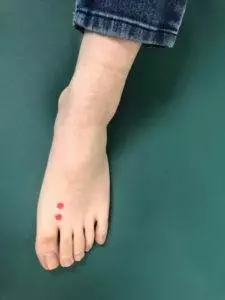Qineng Tan, L.Ac., Ph.D. & Xiaomei Cai, L.Ac., Ph.D.

Fever, fatigue, abdominal pain, jaundice, dark urine–these are possible signs of Hepatitis infection, although many people infected with Hepatitis show no symptoms. For some people, a Hepatitis B or Hepatitis C infection goes away on its own, but in other cases, it can cause serious liver damage, leading to chronic liver disease. Acupuncture and TCM treatment, including Chinese herbs, offer a way to help improve liver function and reduce symptoms of Hepatitis.
There are several variants of the Hepatitis virus that can cause inflammation of the liver, leading to scarring (liver cirrhosis or liver fibrosis), and in some cases leading to chronic liver problems or liver cancer. Hepatitis B (HBV) and Hep C (HCV) are the types of infection that can lead to long-term illness and even liver failure. It is estimated that over 300 million people worldwide are living with the effects of HBV or HCV infections.
There is a vaccination that offers protection against Hepatitis B and Hepatitis A, but there is no vaccine for Hepatitis types C, D, and E. People who have contracted Hepatitis A or an acute form of HBV are usually told to rest and drink lots of fluids. Medical treatment for chronic Hepatitis that lasts for more than six months usually involves antiviral medications that help slow down the spread of the virus through the body. TCM treatment for Hepatitis with acupuncture and herbs works to improve the function of the liver and related organs (spleen, kidneys, gallbladder) and to strengthen the immune system so that the body can overcome the effects of the Hepatitis virus.
What Causes Hepatitis?
There are currently five different types of Hepatitis infection, referred to as: Hepatitis A, Hepatitis B virus (HBV), Hepatitis C (HCV or Hep C), Hepatitis D, and Hepatitis E.
All of these viral infections affect the liver, causing inflammation and possibly scarring, known as cirrhosis of the liver or fibrosis of the liver.

Hepatitis A and E viruses are carried in contaminated water or food supplies. People might contract the Hep A or Hep E virus through eating something like raw shellfish that was in contaminated water, or eating food prepared by a worker who did not wash their hands properly. These variants of Hepatitis may cause an acute infection, but do not lead to chronic conditions.
HBV and HCV are spread through bodily fluids like blood and semen, and can therefore be spread through sexual contact, or the sharing of needles, or a woman may pass the infection to her baby during birth. Hepatitis is a common co-infection in people living with HIV/AIDS. People with Cystic Fibrosis (CF) can also be more prone to infections and liver problems. These more serious forms of Hepatitis can lead to chronic illness, including cancer of the liver, or liver failure, making it one of the primary reasons people end up having a liver transplant.
Autoimmune hepatitis, which has also been called plasma cell hepatitis or lupoid hepatitis, occurs when the immune system mistakenly attacks liver cells.
Top 10 Symptoms of Hepatitis
Symptoms of a HBV or Hepatitis C infection often do not show up for a few weeks, a few months, or in some cases, years later. Some people, especially children, do not feel any symptoms of Hepatitis. The most common Hepatitis symptoms include:
- Abdominal pain, pain in right side
- Swelling in liver area, swollen belly (ascites – fluid buildup in the liver)
- Jaundice, yellow eyes, yellow skin
- Dark urine, pee is dark
- Light colored stools, poop is clay-colored
- Fatigue
- Nausea
- Fever
- Loss of appetite
- Joint pain
Bleeding easily or bruising easily are also potentially signs of Hep C, as is a skin rash, or itchy skin (pruritus), little blisters, or itchy patches of skin like psoriasis. Some people have a sensation of their internal organs itching.
What Is the Treatment for Hepatitis?
If a person shows high levels of liver enzymes and still has the Hepatitis B virus in their body after six months or more, they will often be prescribed medications aimed to slow the spread of the virus and prevent further damage to the liver. There are several types of antiviral medications used to treat patients with long-term effects of Hepatitis, some of them are pills (adefovir, entecavir, lamivudine, telbivudine, tenofovir) that are taken daily for a year, or for several years. Some, known as Interferons, are given as an injection a few times a week over the course of several months or more. These medications can slow the virus in some patients, but for some people, they may not do much to protect the body from liver damage or stop the virus from spreading. These medications can cause serious side effects, including headaches, dizziness, fever, and severe depression. Acupuncture and TCM methods offer an alternative or adjunct support to help promote better liver function and boost the body’s defense against the Hepatitis virus.
What Acupuncture and TCM Can Do for Hepatitis

Hepatitis infection is closely associated with the liver, as it is the liver that shows the most obvious damage as a result of infection, often resulting in cirrhosis or scarring of the liver. But according to TCM philosophy, the other internal organs work in concert with the liver, helping it to do the job of cleaning the blood and supplying it to the rest of the body. Patients with chronic Hepatitis B infection will demonstrate symptoms that help the acupuncture practitioner recognize a particular syndrome pattern, allowing them to use acupuncture points and Chinese herbs to work on deficiencies in the liver and other organs. In TCM theory, Hepatitis infection occurs due to pathogenic forces of toxic Heat and Dampness invading the body. The infection moves through different stages, and the TCM provider will tailor treatment with herbs, acupuncture, and moxibustion to the stage of infection and specific pattern of symptoms.
TCM differentiations of Hepatitis include:
- Liver Qi stagnation – causes symptoms like nausea, poor appetite, distension of the belly or bloated stomach
- Spleen and/or Kidney Yang deficiency – associated with poor appetite, loose stools, sallow complexion, weakness, loss of muscle
- Liver – Gallbladder Dampness and Heat – causes jaundice (yellowing of the eyes and skin), fever, nausea
- Liver – Kidney Yin Deficiency – indicated by headaches, dizziness, irregular periods, stiff joints, poor sleep, irritability, and ringing in the ears (tinnitus)
- Blood stasis – accumulation of blood in the liver contributes to fibrosis or cirrhosis, also causes pain in the lower rib area, menstrual problems, PMS, and depression.
A person may be more susceptible to getting Hepatitis because of some underlying deficiencies in their Qi, and/or the virus may cause those deficiencies to manifest. The main goal of acupuncture treatment for HBV or HCV, therefore, is to strengthen the liver, spleen, and kidneys, to clear any dampness or excess heat from these organs, and to increase the circulation of blood through the systems.
Traditional Chinese herb formulations have been shown in clinical trials to help improve liver function in patients with chronic Hepatitis B.
Herbs that help improve spleen function are believed to help rid the body of the virus and allow for healing of the liver.
Diet and nutrition are, naturally, also very important in helping to strengthen and detoxify the liver and other organs. Your TCM practitioner will go far beyond the usual advice (drink fluids, avoid alcohol), and will give you specific advice for a hepatitis diet plan.

Acupuncture Near Me for Hepatitis in West LA
Chronic Hepatitis B and Hep C infections can be difficult to treat. Using acupuncture and herbs as an adjunct to conventional antiviral therapy for HBV may help to prevent further damage to the liver and improve organ function so that patients can recover from a chronic viral infection more fully. At Art of Wellness, we have over 30 years of experience providing integrative care for those suffering from chronic illnesses of all kinds.
*This article is for education from the perspective of Traditional Chinese Medicine only. The education provided by this article is not approved by FDA to diagnose, prevent, treat and cure human diseases. It should not stop you from consulting with your physician for your medical conditions. Traditional Chinese Medicine is based on Qi, which is an invisible force that usually cannot be observed by modern science. Because science focuses on testing ideas about the natural world with evidence obtained through observation, these aspects of acupuncture can’t be studied by science. Therefore acupuncture and Chinese herbs are often not supported by double-blind, randomized trials, and they are considered alternative medicine therapies in the United States.
